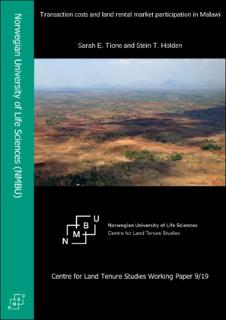Resource information
We assess the extent of access and degree of participation by smallholder tenants in the land rental market in Malawi. Our study is based on three rounds of nationally representative Living Standards Measurement Surveys collected in 2010, 2013 and 2016, from which we construct a balanced panel. We apply the transaction cost theory, which suggests transaction costs to be non-linear and depend on resource as well as socioeconomic characteristics within the customary tenure system that determines who hold, use and transfer land. Controlling for unobserved heterogeneity, the dynamic random effects probit and Tobit models show that transaction costs in the rental market (on the tenant side) are non-linear, high and lead to state dependency in the market. This implies that past land rental experience, social capital and networks, trust and reputation significantly reduce transaction costs and facilitate entry and extent of participation in the rental market. The results point towards the need for land tenure reforms that can reduce these high transaction costs. Access to information through social network could be one way that can improve land access for land-poor and potential tenants, thereby enhancing both equity and efficiency effects of land rental markets.


